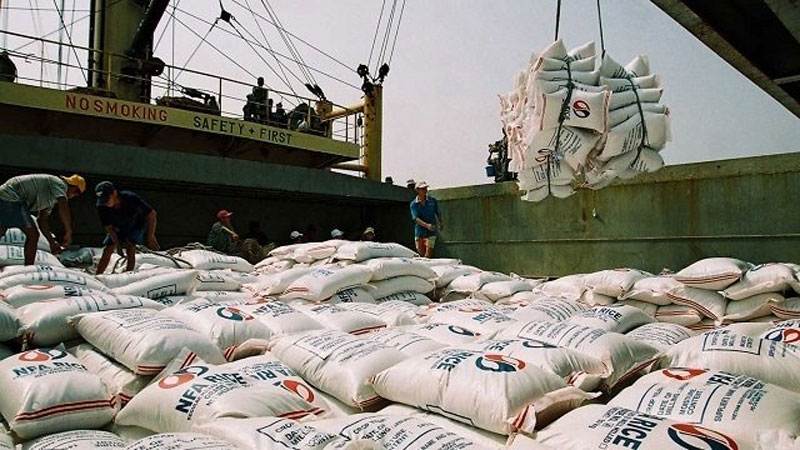
According to the Ministry of Agriculture and Rural Development, in the first quarter of 2019, Vietnam's rice export volume was estimated at 1.43 million tonnes, worth US$ 593 million, down 3.5% in volume and 20.2% in value over the same period in 2018.

Illustrative
image.
The average
export price of rice in the first two months of the year only reached US$404
per tonne, down 17.8% compared to the same period in 2018. Difficulties in
exporting rice in the first quarter have dragged down the price of rice in the
Mekong Delta, especially in February, 2019, when entering the harvest of
winter-spring rice.
Part of the reason for the decline in the volume
of exported rice is due to the fact that the first few months of the year
coincide with the Lunar New Year, plus domestic enterprises have not promoted
delivery and traders who buy rice have not begun to trade yet. On the market
side, in the early months of 2019, some countries still have surplus rice from
2018, so they have no demand for import which in turn makes the market less
active.
In addition, China, one of Vietnam's major rice
import markets for many years, has now reduced their rice purchases, which has
had a relatively large impact. At the same time, measures to closely control
food safety and hygiene for imported rice have been strengthened and there are
more stringent regulations on the supervision and management of imported goods.
Until now, only 21 Vietnamese enterprises are allowed to export rice to the
Chinese market. The reduction of export indications has led to a sharp decline
in rice export volume.
For other traditional markets such as the
Philippines and Indonesia, Vietnam is also facing difficulties in boosting rice
exports to these markets. Specifically, the Philippines is seeking to expand
its rice supply by signing more memorandums of cooperation with Pakistan and
Myanmar. Meanwhile, Indonesia has also restricted imports because the country's
reserved rice is still sufficient until the end of the second quarter of 2019.
Facing the above situation, it is necessary to
strengthen solutions to maintain traditional markets and penetrate new markets.
Specially, it is necessary to pay attention to exporting high quality rice and
specialty rice instead of white rice as before.
In addition, localities need to accelerate the
effective implementation of the restructuring scheme of the rice industry,
because the competition for rice quality is becoming a real "war"
when the rice of some other countries in the region are constantly increasing
competition for Vietnamese rice in terms of quality, value and ways of
promoting their image. Therefore, in addition to improving quality,
strengthening the promotion of rice trade in markets, and the promotion and
image building for Vietnamese rice also are very important, therefore businesses
and authorities should pay greater attention to these requirements. After
building an image of high quality rice seeds with competitive prices, the
export to fastidious markets will certainly become more open, creating new
markets to stabilise the volume and turnover value.
Source: NDO
Appreciating the abundant potential and strengths of his hometown for tourism development, Ha Cong Hung, Deputy Secretary of the youth union of Mai Chau district’s Mai Hich commune, embarked on producing smoked meat with a desire to introduce his homeland's specialty to domestic and international tourists.
Hoa Binh farmers are investing big in their chilli pepper cultivation areas after the first batch of 7.5 tonnes of pickled chilli peppers was shipped to the Republic of Korea (RoK) by Tien Ngan Trade and Investment Co., Ltd last month.
Recognising the role and importance of developing the collective economy, the northern province of Hoa Binh has promptly issued support policies to propel the development of the economy, making important contributions to local socio-economic development.
Prime Minister Pham Minh Chinh attended a groundbreaking ceremony for an electronic printed circuit board (PCB) factory at Da River Left Bank Industrial Park in Hoa Binh province on April 13. The electronic PCB factory is invested by Japan's Meiko Group at a total cost of 200 million USD.
In the first quarter of 2024, the credit institutions in the province have actively deployed the legal documents of the State and the State Bank relating to currency, credit and interest rates. At the same time, they have promoted the capital mobilization, focusing on the solutions to expand the credit investment along with strengthening the credit quality management, lending to priority programs to promptly meet the capital needs for export - business and consumer demand during Tet in 2024.
Outside the key economic region of Hoa Binh, yet Lac Son district has utilised its potential and strengths regarding labour, land, and transportation connectivity to attract investment to the locality, contributing to promoting socio-economic development.



